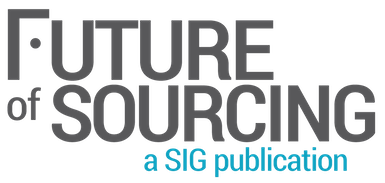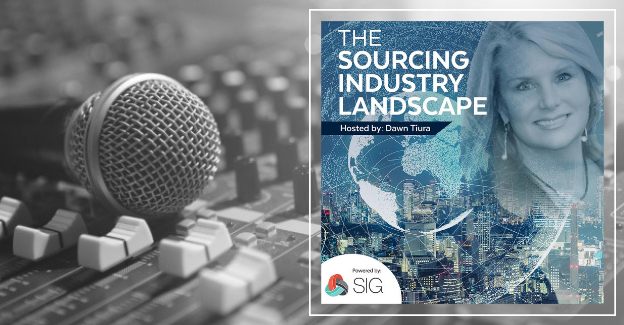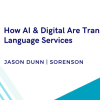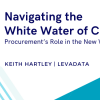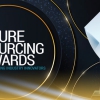In this episode of the Sourcing Industry Landscape, Dawn Tiura interviews Alex Yakubovich. Alex Yakubovich had a non-traditional path into the world of sourcing and procurement. In college, what started out as a project to earn extra cash turned into a profitable e-commerce venture that he and his co-founder later sold to Living Social.
Dawn Tiura: Hi, everybody. This is Dawn Tiura, President and CEO of Sourcing Industry Group. With me today is Alex Yakubovich. He is the CEO of Scout RFP, and he has the most interesting journey as to how he got to where he is today, a fabulous company. We really enjoyed our interaction with them, and it's just going to be an exciting story to hear how quickly this young man rose to such prominence in our industry.
Alex Yakubovich: Hi, Dawn. Thanks for having me on the program.
Dawn Tiura: Yeah, I'm real excited. It's funny, when you and I were talking, I said, "So tell me a little bit about you," and I printed some background information—you have one of the shortest journeys to success I have ever seen. You are just an incredible entrepreneur. I understand you started your first company, ONOSYS Online Ordering when you were still in college. Can you tell me a little bit about that?
Alex Yakubovich: Sure. My co-founder, Stan Garber, and I, we started Onosys. We were college students, and for basically pizza and beer money, we started a web development company, and we went and, effectively, we started to build websites for small businesses all throughout Cleveland, literally going door-to-door. We were 18, 19 at the time, and then one of our customers was a local pizza chain, and we really wanted to get into software as a service and really focus on one software suite. So pizza being near and dear to our heart, one of our customers was a local pizza chain, they asked us to build their online ordering system into their website, and we thought that was a great idea. We loved ordering online. We knew in the future people weren't going to be calling in to order their pizza, but this is actually before the iPhone and before online ordering was everywhere as it is now.
Alex Yakubovich: Yeah, we built that system for them. We kept the rights to it, then we started selling it to other restaurant chains. Before long, we were in Panera; Papa John's; Outback; Carrabba's. We were in over 50 chains throughout the world, thousands of locations, processing hundreds of millions of dollars in orders. It was a fun journey. It taught us a lot about enterprise sales, because we were selling it to these large publicly-traded restaurant chains, and it taught us a lot about enterprise software.
Alex Yakubovich: It also taught us a lot about making software that was really easy to use. Configuring and ordering a pizza and then making sure that everything gets through to the restaurant, it's a very UI intensive process, and you have to make sure that it's super simple to use. It forced us to be very disciplined with that, and that, of course, serves us well today.
Dawn Tiura: That's amazing. So, you're right. Because, back then, we weren't ordering everything online like we do today, so you were very visionary, and it's great that you were able to convince companies in the early stages that this was going to be a trend at some point.
Alex Yakubovich: Yeah, well, in the very early stages, we had to convince them, so we had the more visionary chain restaurants that had the budget and wanted to be ahead of the curve. Once the iPhone came out, and then—I think, actually, after a certain point, and restaurant chains had it, that it just became a disadvantage not to have it, and then business really took off—but it was a great experience. That company was cashflow positive profitable, growing really quickly. We were not looking to sell, but LivingSocial approached us, and they were one of the fastest growing companies at the time. They made us a very compelling offer to be acquired. It was a great experience and a great springboard to Scout, as well.
Dawn Tiura: That's amazing. So, in college, you started a company that then you ran for nine years, then get acquired by LivingSocial. That is a heck of a success story. Can you tell me, what were you studying in college? Was it business, or computers, or both—or programming?
Alex Yakubovich: Engineering for me, and it was business for Stan, and then we had a third co-founder as well who was in the computer science program.
Dawn Tiura: Wow, O.K. Now you've gone on to be very successful in business, and after LivingSocial, you then completely and totally switched industries. Obviously, doing RFPs is—I would never say it's like taking an order in any way, shape, or form. Now you're one of the top selling companies in the sourcing industry. Can you tell me, how did you make that huge leap? Because there is no logical string for me.
Alex Yakubovich: Happy to. What we experienced while selling these large restaurant chains is, basically, if you're selling into publicly-traded companies and to their IT departments, their marketing departments, you're going through the RFP process, and so we built that whole company answering RFPs. Then once we were acquired by LivingSocial, we actually had to put requests for proposals out, because then we were part of a very large company. So when we were going out to buy things over a certain threshold, we had to actually do it the proper way.
Alex Yakubovich: We used to say that we hated RFPs, just like most people when they receive an RFP, nobody loves the RFP process, but we used to say that we really appreciated the actual process of it. We understood what the reasoning for it was, and every once in a while you had a really well-run one. The only thing that was kind of confusing to us was that we had, in all of our years of running ONOSYS and answering all these RFPs, and we answered hundreds of requests for proposals, we'd never seen one come through a system, and it was always manual, so we'd always get this big Excel spreadsheet.
Alex Yakubovich: So we thought that was interesting, and so us having only just the industry experience of being in the restaurant industry, we thought maybe it was just something in that vertical, they just didn't have tools or something. We're product guys, Dawn, so our first instinct is to roll up our sleeves and go out and build something, but we didn't want to do that. We really wanted to learn about the industry, and this is a big part of our DNA today, so we said we're not going to build anything until we go out and we talk to at least 200 people in procurement.
Alex Yakubovich: So 200 procurement experts, and we went out and did this big study. We actually spoke to close to 300 procurement experts before we built anything. And we talked to a lot of the expert companies out there, and certainly talked to like Forrester and Gartner and things like that. Basically what we learned, the big benchmark was the adoption rate for the platforms that existed for sourcing was right around 10%. We saw that both in the studies and the data that we saw, and we also saw that in the study when we went out and talked to individuals who were really just procurement experts and had been doing it for a long time.
Alex Yakubovich: That just surprised us, and then we got to see some of the legacy software that's out there today. The word we kept hearing was "clunky" and hard to use. So what we understood is that there's no shortage of software platforms out there that do sourcing, and there's no shortage of functionality and features out there. The problem is, the adoption rate is very low, because the usability of the platforms are low.
Alex Yakubovich: So we took what we had learned from building e-commerce systems and great enterprise systems, and we built a really simple, easy-to-use RFP platform that helped to run, and our whole philosophy at the very beginning was, “no, you shouldn't need a training manual, you shouldn't need training, you should be able to go in and start using it right away.” And that served us really well, our whole RFP platform, it's three pages long.
Dawn Tiura: That's amazing.
Alex Yakubovich: We've extended that to the rest of our platform, as well. Everything that we build, our very first value here at Scout is obsess over the customer. So everything we build, we start with the customer in mind, and what is their experience going to be like? How can we make it easier? How can we make it straightforward? How can we give them a linear path? The big inspiration we had for that was Intuit and TurboTax. We said, "Look. If Intuit can take the U.S. tax code and make it so that anybody can do their taxes online, we should be able to make it so that people can run their RFPs without hassle.
Dawn Tiura: That's a great comparison. I will be honest with you, I've used a lot of the different tools, but when we were running an RFP from SIG, Scout stepped up and said, "Hey, you can use our tool for free." Immediately, we picked it up and we were able to start just running with it. We didn't have to crawl, walk, and then run. We were able to get it up and running and just go with it. It was as intuitive as you said. I love having that passion about the customers' experience first and foremost. I think that says a lot about the company and why you've been successful.
Dawn Tiura: Have you taken Scout beyond the RFP? Tell me about how it's growing and shifting and developing. What do you see next?
Alex Yakubovich: Yeah, for sure. We have. We've extended it to a full platform at this point. The way that we did that is, basically, we started with our first value, and we went back to our customer. So, we built the RFP platform, and then very quickly our customers told us, "Hey, we'd love to have reverse autcions in here," so we built that in very quickly after that. Then the next thing our customers told us is, basically, at that point, we had a lot of requests for, "Hey, can you help us with contracts? Can you help us with planning? Can you help us with supply and management?"
Alex Yakubovich: At this point we have 150 customers, and we get feedback from every single one of them, but one of the biggest things that was lacking is, everybody was doing their...we understood that sourcing started really with planning, and everybody was doing planning similarly but with different tools, which was very similar to what we found when we went and did the study for ER EFX. So we built a platform called Pipeline, and that was the next big extension. And Pipeline is just like it sounds: it's a full tracking and planning tool that helps you see everything that's going on across your sourcing organization, automatically report on all of the projects that are out, and also with that is an intake platform, as well.
Alex Yakubovich: We have Pipeline intake, we have the eSourcing platform with the reverse options in there and then on top of that, we also built like a smart contract repository. Then we also built a supply performance management system as part of that, as well. We now have a full source to contract platform that our customers leverage.
Dawn Tiura: That's awesome. I love that. Your partners at Scout, are they still the ones that you started off with, with ONOSYS in college? Or have you shifted?
Alex Yakubovich: It's the same four co-founders here that we started with. It's Stan and I to start with, Chris, and Andrew. The one other co-founder from ONOSYS, we're still terrific friends, he stayed with LivingSocial for a little bit longer and then proceeded to afterwards go and travel the world and then start another company, which he since sold, as well. So he's been in Istanbul. We have two other co-founders, and it's Andrew and Chris. They've been a huge part of the success of Scout.
Dawn Tiura: That's fantastic. So tell me, what's next for you personally? Because you've come so far so fast. Do you have a serial entrepreneurial edge to yourself? Do you see yourself starting another company? Or just continue to grow this one?
Alex Yakubovich: No. In just like the last company, we weren't planning on selling that company either, but we get this question all the time, both Stan and I, and we get this question and also the question around like acquisition and things like that. Neither of us have an interest in that. From the very beginning, we went and got funding partners, and our funding partners are Google, New Enterprise Associates, which is the largest venture capital firm in the world, and Google Ventures. All three of those are—what we loved about them—is that their vision for us is to take the company public and continue to run it.
Alex Yakubovich: If you couldn't tell from all your interactions with Stan and I, we're incredibly passionate about what we're doing. We love our customers and all the interactions that we have with them. We're hugely passionate about the software, and that's pretty much universal across all of Scout. Our voices rise a little bit when we talk about it and when we demo it, and we have very passionate conversations here. So we're having a lot of fun. We do want to take the company public at some point. That's in the distant future, but that's our goal, and continue to run it. Everything that we do in terms of what's next will be informed by our customers and the voice that they give us.
Dawn Tiura: I love it, and I love how people are starting to discover you more and more and more. For a while, when you first came onto, as part of SIG, you were sure a well-kept secret. But you've created quite a buzz, and our members are talking about you. So your passion is showing, and I'm passionate about the industry, as you know, and I just love when I find somebody who isn't just in it for the short term and for quick money, but really in it because they love the industry, so I applaud you for that. I just really appreciate that viewpoint. It just gels so well with the SIG members.
Alex Yakubovich: Thank you.
Dawn Tiura: If you were going to go back to...we're going to take a big step backwards to childhood. Did you always dream of being an entrepreneur? Is it something that you always thought, "I can't work for someone else. I'm going to have to do it myself"? Or did you just discover it and it blossomed inside of you in college?
Alex Yakubovich: I wanted to be an entrepreneur from a very early age, and part of it is just, so my family and I moved from the former Soviet Union in the early '90s. We came to America. That's the same story for Stan, as well. Both of us from very early ages had kind of the American Dream, and the family coming over, and the expectation that we would take risks and try to make a big difference and contribute here, so I think it was kind of ingrained. I knew from a pretty early age that I wanted to be an entrepreneur, so yeah.
Dawn Tiura: Wow. We've got a lot of young people that listen to our podcast. If you had a recommendation to a young person who is thinking about the sourcing industry, what is the skillset that you think is absolutely critical to be successful?
Alex Yakubovich: This is what we tell everybody that comes in here, and this is why we start with our values, and our very first value is ‘obsess over the customer’. I think regardless of whether your customer is your manager or your stakeholders, or whoever your customers are, just knowing who they are, what's important to them, and truly listening and genuinely hearing what it is that they need, and learning to anticipate what those needs are, and get them what it takes for them to be successful. I think above all, if you can do that, if you can learn what your customers need and who your customers are and what they genuinely are looking for, that will suit you well in life.
Alex Yakubovich: I think that advice, you read up on books and things like that, the most successful companies like Intuit, the Dale Carnegie, like everybody gives some version of that same advice, and so we decided to just go ahead and bake that into our values and our culture, because that's part of what Stan and I really pride ourselves on is listening and trying to make sure that our customers get what they need to be successful, and we want everybody at Scout to have that same viewpoint. I think for any listener who is starting out in their career or is anywhere, that's so important to cultivate as a skill, because it is something that's easy to forget and easy to lose.
Dawn Tiura: You know, Alex, for years I was in sourcing consulting, and it was one of the things I was passionate about talking to the procurement organization is know your customer. Know what their five-year plan is. Know what their goals are for next year. So many companies want to almost like do sourcing to them rather than do sourcing to make them successful, and then being the business units.
Dawn Tiura: Your message certainly resonates with me, because just so many times they just haven't known their customer; they weren't listening to the customer; they were just going in and immediately saying, "I'm going to save you money. I'm going to streamline things," but not listening. Were they focused on capital expenditures? Or O&M expenditures, which are very different how they hit the books. And just what does success look like? It might just be quality improvement, and not even a cost issue at all. I think you're absolutely spot-on with what is needed more in the industry, and I'm so glad that that's baked into the culture of your company, as well.
Alex Yakubovich: Thank you.
Dawn Tiura: If you were to be able to go back and be able to talk to your younger self, what piece of advice do you think that it would've been nice to know? I'm not sure that there's anything that could've made you more successful, but what would you wish you could've done differently, or could've learned at an earlier age?
Alex Yakubovich: I've gotten that question before, like if I could change one thing, I would probably...and I don't know how much of a difference this would've made, but I love the fact that we grew up in the Midwest and had Midwestern…built our first company in the Midwest and had the Midwestern roots, but we have since moved the company to San Francisco. There is a difference to the cadence, to the speed, and to the intensity, and to the network that is here. So maybe coming to the Bay Area a little bit sooner to grow the company and really cultivate it.
Alex Yakubovich: We were a little slow to move out here because of just not knowing what moving to the Bay Area would be like, but it's such a huge advantage for us to be close to the really big, very progressive companies. As we start to think about the future, I should say, as we continue to think about the future of things that we can build and how technology can help enable our customers to be successful, and what they'll need in the future—just having all those resources here to have those conversations on and see what's coming down the road—it's just so instrumental.
Dawn Tiura: That's interesting, because I really thought with your earlier successes, that you wouldn't need the Bay Area, because you already knew how to be successful. So it's interesting, but it still makes a difference to be surrounded by that kind of talent and drive and passion.
Alex Yakubovich: It makes a big difference just to have the mentors and people to listen to. Yeah, it's been very rewarding.
Dawn Tiura: I think one of the neatest things is that you're very successful. You're the CEO of Scout RFP, and yet you're one of the most approachable people in the industry; you're humble; you're not stuck up; you're not driven by ego. I've met hundreds of people in this industry, and that is a rarity. I just want to applaud you for keeping your roots and keeping yourself humble and keeping yourself so approachable. I think it just speaks volumes for you as a person. I've really enjoyed getting to know you.
Alex Yakubovich: Thanks, Dawn. I really enjoyed getting to know you and all the interactions we've had with SIG. You've built a really great organization and really great group of people.
Dawn Tiura: Thank you. They're all passionate, too. I just want to thank you for coming on. I'd love to invite you back to the podcast maybe a year from now and hear what other super exciting things that are going on in your life at that point. Would you be open to coming back?
Alex Yakubovich: Would to do that. Would love to do that.
Dawn Tiura: Good. Thank you. Good, I'm going to hold you to it. So, folks, I'm talking with Alex Yakubovich. He is the CEO of Scout RFP, and it's been my sincere pleasure, Alex, spending a little bit of time with you today. So thank you so much.
Alex Yakubovich: Thank you, Dawn. Appreciate it.

